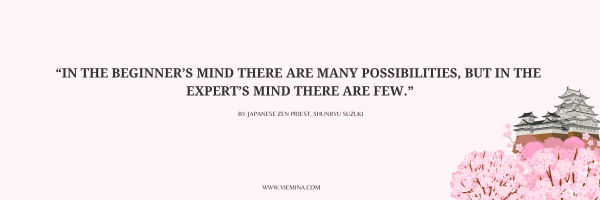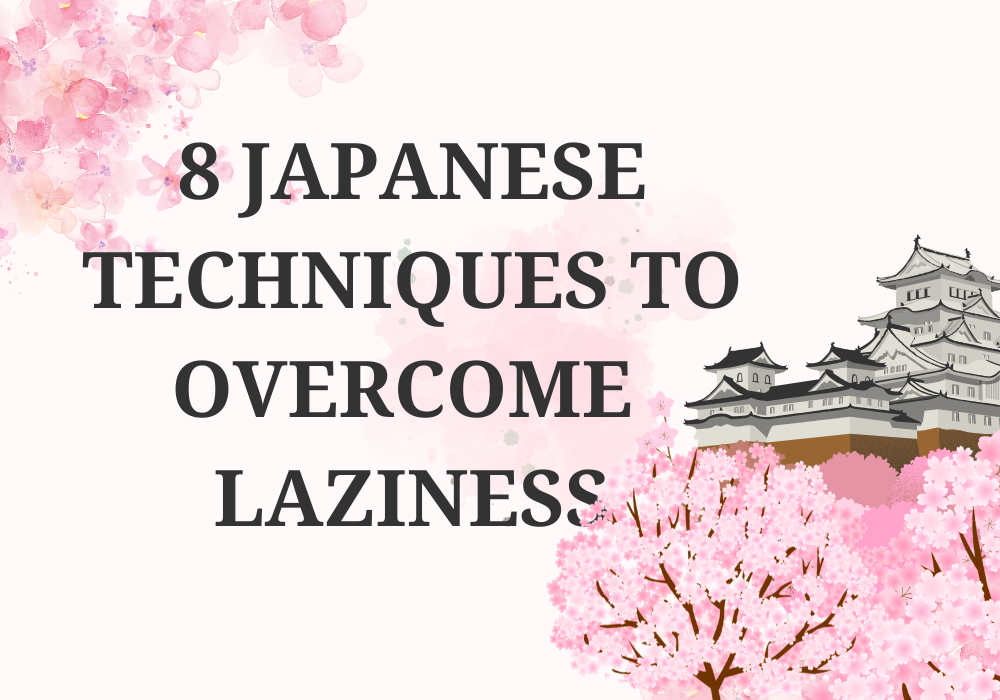What are the Japanese techniques to overcome laziness?
Are you feeling stuck and unmotivated? You’re not alone! We all have those lazy days when getting off the couch or stopping scrolling on our phones is hard. But did you know that Japan has some cool Japanese techniques to overcome laziness and get back on track? These simple methods focus on small steps and building good habits over time.
These easy strategies can help you stay focused, beat procrastination, and feel more productive without overwhelming yourself. Ready to give them a try? Let’s dive in!
1-Kaizen (Making small improvements):
Feeling stuck or overwhelmed by big goals? That’s where Kaizen (meaning “continuous improvement,”) can help! This Japanese technique is all about making small, simple changes every day to improve your life.
Instead of trying to do everything perfectly immediately, Kaizen focuses on tiny steps that add up over time. For example, instead of aiming to “exercise daily,” start with five minutes of stretching each morning.
The idea is to be just 1% better each day. These little improvements keep you moving forward, help you stay motivated, and make it easier to beat procrastination. With Kaizen, you can build good habits and feel more productive without feeling overwhelmed.
Related: 12 Tips To Overcome Procrastination and Boost Productivity
Related:
2-Ikigai (Finding Purpose):
Ever wonder what gets you excited to jump out of bed each morning? That’s the idea behind “Ikigai”, a Japanese concept that combines “iki” (life) and “gai” (worth), meaning “reason for being.” It’s all about discovering what gives your life purpose and makes you feel fulfilled.
Here’s how to find your Ikigai:
- Do what you love: Think about activities that bring you joy and fulfillment.
- Do what you’re good at: Focus on your strengths and talents.
- Do what the world needs: Consider how you can contribute to others or make a difference.
- Do what you can be paid for: Find a way to turn your passion into something sustainable.
When you align your daily activities with these four principles, work feels less like a chore and more like a rewarding experience. Ikigai helps you stay motivated by connecting your actions to a deeper purpose, making it easier to overcome laziness and find joy in the journey.
Related: Discover Your True Purpose in Life with 8 Essential Tips
3-Hara Hachi Bu (Eat until you’re 80% full):
Ever feel sluggish after a big meal? That’s where “Hara Hachi Bu”, an Okinawan practice, comes in. It translates to “eat until you’re 80% full.” The idea is simple: stop eating before you’re completely stuffed. This helps prevent the sluggishness and lethargy that often follow overeating.
By adopting this mindful eating habit, you not only avoid that post-meal crash but also maintain steady energy throughout the day. It’s a great way to stay productive and feel more comfortable after meals. Plus, it’s a habit linked to the long and healthy lives of people in Okinawa, known as the “land of the immortals.” So, the next time you’re eating, try stopping at 80% full—you’ll be amazed at how much better you feel!
Related: 10 Ways to Stop Emotional Eating And Be Mindful Of Your Diet
4-Shoshin (Cultivating a Beginner’s Mind):
One of the most effective Japanese techniques to overcome laziness is “Shoshin mindset”.
“Shoshin” means “beginner’s mind.” It’s a simple idea from Zen Buddhism that encourages you to look at everything with curiosity and an open heart. As Shunryu Suzuki, a famous Zen teacher, said, “In the beginner’s mind, there are many possibilities.” This means letting go of what you already think you know and being ready to see things in a new way, no matter how experienced you are.
When you use a “Shoshin” mindset, tasks become more fun and interesting, and you’re less likely to put them off. Whether it’s schoolwork, learning a new skill, or making new friends, approaching each situation as if it’s your first time can spark creativity and help you learn more. So, next time you face a challenge, try to think like a beginner—who knows what amazing new things you might discover?

Related: The Power of Mindset Transformation: 15 Keys to Success
Related: 17 Signs that you have a strong mindset
5-Wabi-Sabi (Embracing Imperfections):
Wabi-sabi is a cool Japanese idea that helps us appreciate imperfections and see beauty in flaws. Instead of trying to be perfect all the time, Wabi-Sabi encourages us to enjoy the unique and imperfect parts of ourselves and the world around us. For example, in Japanese pottery, cracks are sometimes filled with gold to show that these flaws make the piece special.
When it comes to Japanese techniques to overcome laziness, Wabi-Sabi can play a key role. Many times, laziness comes from being scared of failing or wanting everything to be perfect. By thinking like Wabi-Sabi, we can let go of that pressure and start doing things, even if they aren’t flawless. This way of thinking helps us focus on small, easy steps, which can help us move forward instead of feeling stuck.
Related: Embracing Imperfection: 9 Top Steps to Self-Acceptance
Related: Why Do I Feel Like a Failure? 20 Causes That Might Shock You
6-Ganbaru (Perseverance and Dedication):
Ganbaru means “Do Your Best”. It’s all about putting in your full effort and staying determined, even when things get tough. This concept encourages you to keep pushing through challenges and to be patient with yourself as you work toward your goals.
Ganbaru is important in Japanese culture, and you can see it in many areas like school, work, sports, and personal goals. By embracing Ganbaru, you build resilience and strength, which helps you face obstacles with confidence and a focus on getting better.
So, whenever you feel like giving up, remember to “Ganbaru”! Just do your best, and keep going!
7-Kakeibo (Mindful Budgeting for Time and Money):
Kakeibo is a traditional Japanese technique that helps you keep track of your money. You write down what you earn, and what you spend, and think about how you can save more. It’s all about being smart with your spending and saving for the things that really matter.
But guess what? You can use Kakeibo for more than just money! You can use it to manage your time too. By keeping track of how you spend your time, you can figure out what’s important, stay focused, and overcome laziness. It’s like budgeting your time so you can get stuff done and still have fun!
“Monthly Budget Planner – Printable & Digital for Easy Money Management“

8-Shinrin-Yoku (The Art of Forest Bathing):
Shinrin-Yoku, or “forest bathing,” is a Japanese technique to overcome laziness and clear your mind by spending mindful time in nature. It’s not about taking an actual bath but soaking in the peaceful vibes of a forest or any green space. This simple habit can reduce stress, improve focus, and refresh your mind.
No forest nearby? No worries! You can enjoy Shinrin-Yoku in a garden, park, or even on a rooftop. Spending time in nature boosts your energy and makes it easier to get things done. Feeling stuck? Step outside and let nature inspire you!
“This method was created in the 1980s by Japan’s Ministry of Agriculture, Forestry, and Fisheries to reduce stress in urban environments and promote better mental and physical well-being.”
Related: How To Improve Mental Clarity? 16 Ways to Achieve It
In Conclusion:
If you’re looking to overcome laziness and unlock your full potential, consider incorporating “Japanese techniques to overcome laziness” into your daily life. These methods encourage you to take small steps, stay curious, and focus on what truly inspires you. It’s normal to have lazy days, but these techniques can help you turn those moments around. By embracing these strategies, you’ll not only build better habits but also boost your productivity and find more purpose in everything you do.
So why wait? Start applying these techniques today and watch yourself grow!








